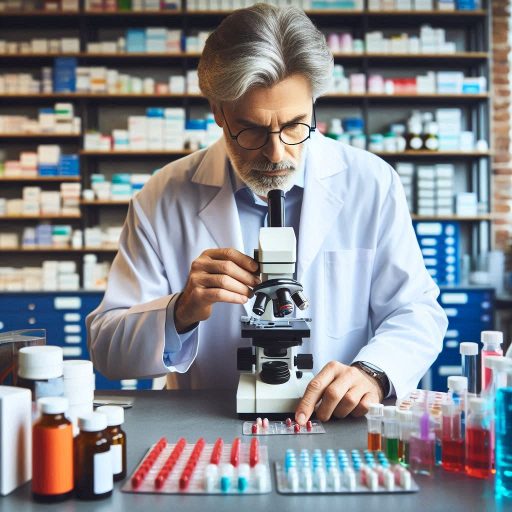Introduction
A pharmacologist is a specialized scientist who focuses on understanding the effects of drugs and medications on biological systems.
They study how various substances interact with living organisms, analyzing their therapeutic benefits, side effects, and mechanisms of action.
This discipline combines elements of biology, chemistry, and medicine to ensure that medications are effective and safe for patient use.
Pharmacologists play a crucial role in drug development, conducting research to formulate new medications and test existing ones for their safety and efficacy.
The importance of pharmacologists in the healthcare industry cannot be overstated.
They are integral to the drug development process, working diligently to bring new medications to market.
Pharmacologists conduct preclinical and clinical trials to gather data on how drugs behave in the human body, identifying optimal dosages and potential side effects.
This research ensures that new therapies not only address medical conditions effectively but also prioritize patient safety.
Moreover, pharmacologists collaborate with various stakeholders, including researchers, healthcare providers, and regulatory agencies, to ensure compliance with safety standards.
They provide critical insights that guide physicians in selecting the most appropriate treatments for their patients.
Their expertise helps healthcare professionals understand drug interactions, potential risks, and contraindications, enabling better-informed decisions in clinical practice.
Morning Routine
Waking Up and Getting Ready for the Day
A pharmacologist’s day starts early, often before sunrise.
The alarm rings, signaling the beginning of a busy day.
Waking up on time is essential for productivity.
Many pharmacologists follow a consistent morning routine to set the right tone.
After waking, the first task is personal hygiene.
A quick shower and grooming help them feel refreshed and alert.
Getting dressed in comfortable yet professional attire is next.
Pharmacologists often choose outfits that reflect their professionalism and readiness for work.
Reviewing Schedule and Tasks for the Day
Once ready, they review their schedule for the day.
This review includes meetings, research activities, and lab work.
They check emails for any urgent messages or updates.
This initial assessment helps prioritize tasks effectively.
Knowing the day‘s agenda prepares them mentally for what lies ahead.
As they go through their schedule, pharmacologists also note any important deadlines.
They may jot down key points to discuss in meetings.
This organization allows them to navigate the day with confidence.
Having Breakfast and Preparing for Work
Breakfast is an important part of the morning routine.
A healthy meal fuels their body and brain.
Many opt for protein-rich foods, like eggs or yogurt.
Some prefer quick options, like smoothies or oatmeal, for convenience.
Eating breakfast allows them to focus better throughout the day.
While enjoying breakfast, pharmacologists often catch up on industry news.
They read articles or journals related to pharmacology.
Staying updated on trends and discoveries is crucial in their field.
It informs their work and keeps their knowledge current.
After breakfast, they gather any materials needed for the day.
This may include research papers, lab notes, or notebooks for jotting down observations.
Organizing these items ensures they are prepared for meetings or experiments.
Being well-prepared is essential for a successful day in the lab.
As they leave home, pharmacologists often listen to educational podcasts.
These podcasts cover topics in pharmacology, medicine, or science.
This helps them start the day with fresh insights.
Engaging with new information keeps their passion for the field alive.
Commuting to work can vary for each pharmacologist.
Some drive, while others take public transportation.
During this time, they mentally review their tasks.
This mental preparation sets a focused mindset for the day.
Arriving at the workplace, pharmacologists greet their colleagues.
This interaction fosters a collaborative atmosphere in the lab.
They quickly settle into their workspace and check messages.
Addressing any immediate concerns ensures a smooth start.
In summary, the morning routine of a pharmacologist is structured and purposeful.
Waking up early, preparing, and reviewing the day‘s tasks lay the foundation for success.
Breakfast fuels their body, while industry updates enrich their knowledge.
These morning habits create a productive mindset for the challenges ahead.
Work Environment
Typical Workplace Setting for a Pharmacologist
The work environment of a pharmacologist typically consists of laboratories and research facilities.
These settings are equipped with advanced scientific equipment and technology.
Pharmacologists may also work in hospitals, universities, or pharmaceutical companies.
Each location offers unique opportunities for research and collaboration.
In laboratories, pharmacologists conduct experiments to study drug interactions and effects.
They analyze chemical compounds and test new medications.
A clean and organized workspace is crucial for maintaining safety and efficiency.
Most labs follow strict protocols to ensure accurate results.
Interaction with Colleagues and Team Members
Interaction with colleagues is a key aspect of a pharmacologist’s workday.
Pharmacologists often collaborate with scientists, researchers, and healthcare professionals.
These interactions promote the exchange of ideas and knowledge.
Sharing insights can lead to innovative approaches in research and drug development.
Regular meetings and discussions help pharmacologists stay aligned with team goals.
They present findings, share challenges, and brainstorm solutions together.
Effective communication fosters a supportive environment where everyone contributes to the project.
Importance of Teamwork in the Pharmacology Field
Teamwork is essential in the field of pharmacology.
Collaborative efforts lead to more comprehensive research outcomes.
Different expertise and perspectives enhance problem-solving abilities.
Pharmacologists often rely on chemists, biologists, and clinicians to achieve their goals.
Successful projects require coordinated efforts from various team members.
Each member brings unique skills that contribute to the overall success.
A strong team can navigate complex research challenges more effectively.
Teamwork also helps to distribute workloads, reducing stress and preventing burnout.
Moreover, teamwork promotes a culture of learning and growth.
Colleagues can mentor one another and share experiences.
This continuous exchange of knowledge strengthens the team’s capabilities.
In addition, a collaborative work environment boosts morale and job satisfaction.
The work environment of a pharmacologist is dynamic and collaborative.
A typical workplace includes laboratories and research facilities where experimentation occurs.
Interaction with colleagues enhances the research process and fosters innovation.
Teamwork is vital in pharmacology, as it combines diverse expertise and perspectives.
This collaborative spirit ultimately drives progress in drug development and healthcare solutions.
Read: Botany Career Fairs and Networking Events
Daily Tasks
Conducting Research on New Drugs and Treatments
A pharmacologist‘s day revolves around conducting research on new drugs and treatments.
This involves designing experiments to evaluate the safety and efficacy of medications.
Pharmacologists work with various substances, including chemical compounds and biological samples.
They carefully plan studies to gather accurate data.
In the laboratory, they perform a range of tests.
These may include in vitro studies, animal trials, and clinical research.
Each stage of research requires precision and attention to detail.
Pharmacologists must follow strict protocols to ensure the integrity of their results.
Staying informed about the latest scientific advancements is crucial.
Pharmacologists review recent literature and attend conferences to learn about new findings.
This knowledge helps them identify potential research opportunities and improve existing treatments.
Analyzing Data and Writing Reports
After conducting experiments, analyzing data becomes a critical task.
Pharmacologists use statistical tools to interpret the results of their studies.
They identify trends and assess the significance of their findings.
This analysis is essential for drawing valid conclusions about new drugs.
Once the data is analyzed, pharmacologists compile their findings into reports.
These reports summarize the research methodology, results, and interpretations.
Clear and concise writing is vital for communicating their discoveries to other professionals.
Reports may be submitted for publication in scientific journals or presented at conferences.
Documentation is also crucial for regulatory compliance.
Pharmacologists must maintain accurate records of their experiments and data.
This transparency supports the credibility of their research and ensures adherence to ethical standards.
Collaborating with Other Healthcare Professionals
Collaboration with other healthcare professionals is a fundamental aspect of a pharmacologist’s role.
They often work closely with clinicians, nurses, and researchers.
These collaborations enhance the development and implementation of new treatments.
Pharmacologists may participate in interdisciplinary meetings to discuss patient care and treatment plans.
They provide valuable insights on medication selection and potential side effects.
This teamwork ensures that patients receive safe and effective therapies.
Additionally, pharmacologists collaborate with regulatory agencies to ensure compliance.
They help navigate the approval process for new drugs, providing essential data and documentation.
Working together with these agencies facilitates the timely introduction of innovative treatments.
The daily tasks of a pharmacologist are diverse and multifaceted.
Conducting research on new drugs is a primary focus, requiring careful experimentation and analysis.
Writing reports helps communicate findings, while collaboration with healthcare professionals enhances patient care.
These activities collectively contribute to the advancement of pharmacology and the improvement of health outcomes.
Read: The Future of Botany: Emerging Fields and Innovations
Lab Work
Performing Experiments and Tests on Samples
Lab work is a central aspect of a pharmacologist‘s daily routine.
Pharmacologists perform various experiments and tests on biological and chemical samples.
These tests evaluate the safety and efficacy of new drugs and treatments.
Each experiment is carefully designed to yield reliable and reproducible results.
In the lab, pharmacologists may use advanced techniques, such as chromatography and mass spectrometry.
These methods help separate and analyze complex mixtures of substances.
Additionally, they conduct assays to measure biological activity and response.
Proper execution of these tests is crucial for drawing valid conclusions.
The lab environment is dynamic, with each day presenting new challenges.
Pharmacologists must adapt their methods based on the specific objectives of their research.
This flexibility enhances their problem-solving skills and scientific acumen.
Ensuring Accuracy and Precision in Lab Work
Accuracy and precision are vital in laboratory work.
Pharmacologists strive to produce reliable data that can inform drug development decisions.
They meticulously calibrate instruments and validate methods to ensure consistent results.
Small errors in measurement can lead to significant variations in outcomes.
Data management is also crucial in maintaining accuracy.
Pharmacologists carefully document every step of their experiments.
This documentation includes details about procedures, observations, and results.
Keeping thorough records helps track progress and supports future research efforts.
Regular quality control measures are implemented to uphold standards.
Pharmacologists may participate in proficiency testing and peer reviews to assess their work.
These practices reinforce a commitment to scientific integrity and excellence.
Adhering to Safety Protocols and Regulations
Safety is paramount in the lab environment.
Pharmacologists adhere to strict safety protocols and regulations to protect themselves and their colleagues.
They wear appropriate personal protective equipment, such as gloves, goggles, and lab coats.
This gear minimizes the risk of exposure to hazardous materials.
Before conducting experiments, pharmacologists review relevant safety guidelines.
They ensure that all equipment is functioning correctly and that safety devices are in place.
Knowledge of emergency procedures is essential for handling accidents or spills.
In addition to personal safety, pharmacologists must comply with regulatory standards.
These regulations ensure ethical conduct in research involving human or animal subjects.
Compliance with Institutional Review Boards (IRBs) and Good Laboratory Practices (GLPs) is crucial.
This adherence builds trust in their research and promotes responsible scientific practices.
Lab work is a fundamental responsibility of pharmacologists.
Performing experiments and tests on samples requires precision and skill.
Ensuring accuracy in lab work is essential for reliable results.
Adhering to safety protocols and regulations protects everyone involved in the research process.
Together, these elements contribute to the successful advancement of pharmacological science.
Read: What Does a Geologist Do? Career Overview and Insights

Patient Interaction
Consulting with Patients on Medications and Treatments
Patient interaction is a vital aspect of a pharmacologist’s role.
Pharmacologists often consult with patients regarding their medications and treatment plans.
During these consultations, they assess the patient‘s medical history and current health status.
This information helps them recommend the most suitable medications.
Pharmacologists educate patients about their prescribed drugs.
They explain how these medications work and the conditions they treat.
This communication ensures that patients understand the purpose of their treatments.
Building rapport with patients is crucial for effective consultations and promotes trust.
These interactions may occur in various settings, including clinics and hospitals.
Pharmacologists often collaborate with healthcare teams to provide comprehensive care.
Their expertise in pharmacology enhances the overall treatment process.
Providing Guidance on Dosage and Side Effects
Providing accurate guidance on medication dosage is a key responsibility.
Pharmacologists ensure that patients understand how to take their medications correctly.
They explain the prescribed dosage, frequency, and duration of treatment.
This guidance helps prevent potential medication errors and optimizes therapeutic outcomes.
Additionally, pharmacologists inform patients about possible side effects.
They discuss common and serious reactions to medications.
This information allows patients to recognize adverse effects early and seek help if needed.
By addressing these concerns, pharmacologists empower patients to manage their health effectively.
Pharmacologists also review patients‘ current medications for potential interactions.
This thorough approach ensures that patients receive safe and effective treatment.
They may suggest adjustments to the treatment plan if necessary.
Answering Questions and Addressing Concerns
Pharmacologists are a valuable resource for patients seeking information.
They answer questions about medications, treatments, and health conditions.
This interaction fosters an open dialogue, allowing patients to express their concerns.
Addressing patient concerns is essential for building trust and rapport.
Pharmacologists take the time to listen and provide thoughtful responses.
They clarify any misconceptions about medications and their effects.
This approach encourages patients to adhere to their treatment plans.
In addition to individual consultations, pharmacologists may conduct educational sessions.
These sessions inform patients about new medications, treatment options, and health management strategies.
By engaging patients in their care, pharmacologists promote better health outcomes.
Patient interaction is a critical component of a pharmacologist’s role.
Consulting with patients about medications and treatments fosters understanding and trust.
Providing guidance on dosage and side effects ensures safe medication use.
Answering questions and addressing concerns empowers patients to take an active role in their health.
Together, these interactions enhance the overall quality of patient care and support positive health outcomes.
Read: Educational Path: Becoming a Geologist in the USA
Transform Your Career Today
Unlock a personalized career strategy that drives real results. Get tailored advice and a roadmap designed just for you.
Start NowContinuing Education
Staying Updated on New Advancements in Pharmacology
Continuing education is essential for pharmacologists in a rapidly evolving field.
Staying updated on new advancements in pharmacology ensures they provide the best care possible.
Pharmacologists regularly review current literature, including scientific journals and research articles.
This practice helps them understand emerging trends and breakthroughs.
New drug discoveries and treatment protocols are constantly changing.
Pharmacologists need to be aware of these updates to make informed decisions.
By staying current, they can better advise healthcare teams and patients on effective therapies.
Additionally, following reputable online platforms and industry news keeps them informed.
Pharmacologists utilize webinars and online courses to access timely information.
This commitment to lifelong learning is crucial for professional growth.
Attending Conferences and Workshops
Attending conferences and workshops is another vital aspect of continuing education.
These events provide opportunities for networking and collaboration with peers.
Pharmacologists can exchange ideas and share experiences with other professionals in the field.
Conferences often feature keynote speakers who discuss groundbreaking research and innovations.
Workshops allow pharmacologists to participate in hands-on training sessions.
These interactive experiences enhance their skills and knowledge in specific areas of pharmacology.
By attending these events, pharmacologists can earn continuing education credits.
Many licensing boards require these credits to maintain professional certification.
Engaging in professional development activities demonstrates their commitment to the field.
Pursuing Further Education or Certifications
Pharmacologists often pursue further education or specialized certifications to advance their careers.
Advanced degrees, such as a Doctor of Pharmacy (PharmD) or PhD, provide deeper knowledge and expertise.
These programs enhance their understanding of pharmacology, toxicology, and clinical practices.
Certifications in specialized areas, such as clinical pharmacology or pharmacotherapy, are also valuable.
These credentials signal expertise and proficiency to employers and peers.
Pursuing additional qualifications can open doors to leadership roles or specialized positions.
Engaging in continuing education ultimately benefits both pharmacologists and their patients.
Well-informed pharmacologists can provide better care and improve patient outcomes.
Their commitment to lifelong learning fosters a culture of excellence in the healthcare field.
Continuing education is crucial for pharmacologists to remain competitive.
Staying updated on new advancements, attending conferences, and pursuing further education all contribute to professional growth.
These efforts enable pharmacologists to provide high-quality care and stay at the forefront of the industry.
Discover More: Archaeologist Salary: What to Expect in the USA
Challenges Faced
Dealing with Ethical Dilemmas in Drug Testing
Pharmacologists frequently encounter ethical dilemmas in drug testing.
Ensuring patient safety while conducting research poses significant challenges.
They must balance the potential benefits of new medications against possible risks.
This responsibility requires careful consideration and adherence to ethical standards.
Pharmacologists face scrutiny from regulatory bodies regarding their research practices.
They must ensure compliance with ethical guidelines, particularly when involving human or animal subjects.
Transparency and integrity in research are paramount to maintaining public trust.
Ethical dilemmas can also arise in informed consent processes.
Pharmacologists must ensure that patients fully understand the risks and benefits of participation.
This obligation requires effective communication and a commitment to patient autonomy.
Balancing Multiple Projects and Deadlines
Balancing multiple projects and deadlines is a common challenge for pharmacologists.
They often juggle several research studies and administrative tasks simultaneously.
Prioritizing responsibilities can be difficult in a fast-paced environment.
Time management skills are essential for success in this role.
Pharmacologists must create schedules to meet project milestones while maintaining quality.
Effective organization helps them manage competing demands and prevent missed deadlines.
Collaboration with colleagues can ease this burden.
Working in teams allows pharmacologists to share workloads and leverage diverse expertise.
This teamwork fosters a supportive environment, helping them meet project goals efficiently.
Managing Stress and Burnout in a Demanding Field
The demanding nature of pharmacology can lead to stress and burnout.
Long hours and high expectations can take a toll on mental and physical well-being.
Pharmacologists must find effective strategies to manage stress and maintain a healthy work-life balance.
Self-care practices, such as regular exercise and mindfulness, are crucial.
Engaging in hobbies outside of work helps them recharge and alleviate stress.
Seeking support from colleagues and supervisors can also foster a sense of community and connection.
Organizations play a role in preventing burnout by promoting a positive work culture.
Providing resources for mental health support and encouraging breaks can alleviate stress.
Creating an environment that values employee well-being enhances productivity and job satisfaction.
Pharmacologists face several challenges in their roles.
Dealing with ethical dilemmas in drug testing requires a commitment to integrity and transparency.
Balancing multiple projects and deadlines demands strong time management skills.
Finally, managing stress and burnout is essential for sustaining a fulfilling career.
Addressing these challenges effectively contributes to success in the pharmacology field.
Conclusion
A day in the life of a pharmacologist is dynamic and fulfilling, offering a unique blend of science and patient care.
These professionals play a crucial role in developing new medications and ensuring their safety and effectiveness.
A typical day may start with reviewing research data from ongoing studies.
Pharmacologists analyze the results to draw meaningful conclusions and make informed recommendations.
They often collaborate with a diverse team, including scientists, clinicians, and regulatory experts, to advance drug development.
Meetings may involve discussing trial protocols or addressing regulatory requirements, which are essential for bringing new drugs to market.
The role demands both analytical skills and creativity, as pharmacologists must solve complex problems and design innovative experiments.
The rewarding aspects of this profession include the satisfaction of improving patient outcomes.
Each discovery can lead to life-changing treatments, making the work meaningful.
Pharmacologists also enjoy intellectual challenges and continuous learning opportunities in their field, staying abreast of the latest research and advancements.
For aspiring pharmacologists, pursuing this career can be immensely gratifying.
If you are passionate about science and dedicated to improving health, consider this path.
The profession offers the chance to make a significant impact on people’s lives through your work.
Embrace the journey, and remember that every day brings new challenges and opportunities for growth.
With determination and commitment, you can contribute to a healthier future for all.
[E-Books for Sale]
The Big Book of 500 High-Paying Jobs in America: Unlock Your Earning Potential
$19.99 • 500 High-Paying Jobs • 330 pages
Explore 500 high-paying jobs in America and learn how to boost your career, earn more, and achieve success!
See All 500 High-Paying Jobs of this E-Book
1001 Professions Without a Degree: High-Paying American Jobs You Can Start Now
$19.99 • 1001 Professions Without a Degree • 174 pages
Discover 1001 high-paying jobs without a degree! Unlock career tips, skills, and success strategies for just $19.99!




